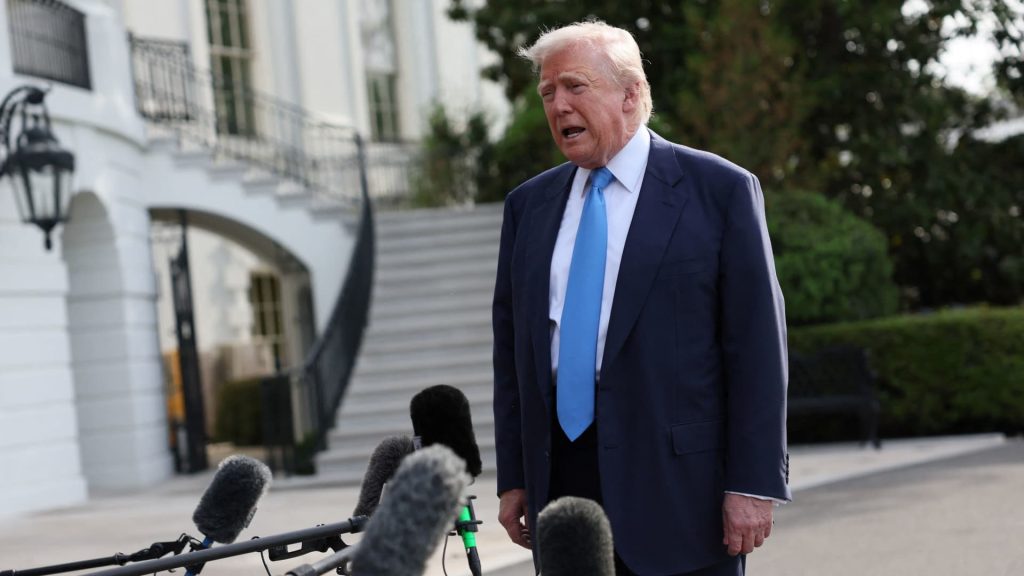In a challenging political landscape, President Donald Trump faces declining approval ratings as he approaches the 100-day mark of his presidency. Recent polling data suggests a majority of Americans disapprove of his governance style, particularly regarding economic management and immigration policies. As skepticism grows, the confidence of many voters in Trump’s ability to steer the country appears to be waning, indicating potential challenges ahead for his administration.
| Article Subheadings |
|---|
| 1) Polling Decline: Trump’s Approval Ratings Dwindle |
| 2) Economic Confidence: A Growing Concern |
| 3) Immigration Approval: Struggling to Maintain Support |
| 4) Partisan Responses: A Divisive Presidency |
| 5) Implications for the Future: Navigating Challenges Ahead |
Polling Decline: Trump’s Approval Ratings Dwindle
Recent polling has shown that President Donald Trump’s approval rating is dipping significantly as he nears 100 days in office. Studies from reputable organizations reveal that his approval ratings fall between 39% and 45%. Notably, this marks the lowest approval rating recorded for any newly elected president at this milestone in over seventy years. The Washington Post, in partnership with ABC News and Ipsos, indicates that only 39% of U.S. adults support Trump’s presidency, while another survey by CNN/SSRS places approval at 41%, with the NBC News Stay Tuned Poll showing 45%. This decline is particularly stark when compared to Trump’s initial return to the White House, when his favorability ratings were experiencing a slight uptick. The data suggests that as Trump’s presidency progresses, American sentiment is increasingly negative.
Economic Confidence: A Growing Concern
Trump’s administration has also seen a decline in public confidence regarding his economic competencies, a pivotal issue in his presidential campaign. In the CNN/SSRS poll, only 52% of participants express trust in Trump’s management of the economy, marking a troubling 13-point decrease since December. Notably, many Americans are apprehensive about the economic ramifications of his policies. Close to 72% of those surveyed in the Washington Post-ABC News-Ipsos poll believe Trump’s economic initiatives could trigger a recession in the near future. Furthermore, a majority of Americans disapprove of Trump’s handling of trade and tariffs (61%) and inflation and cost of living (60%). This growing discontent raises questions about the sustainability of Trump’s economic policies and their longer-term effects on the national economy.
Immigration Approval: Struggling to Maintain Support
In addition to economic issues, Trump’s handling of immigration has come under scrutiny, another cornerstone of his political agenda. The CNN survey shows that his approval rating for immigration management stands at only 45%, a marked decline from December when it hovered around 60%. This dip reflects a broader trend of skepticism surrounding Trump’s policies as they relate to immigration reform and border security. As the administration struggles to maintain support in this area, the implications for future legislations and public sentiment could be substantial, particularly among key voting demographics.
Partisan Responses: A Divisive Presidency
Trump’s approval ratings reveal a stark division along partisan lines, highlighting the polarized political climate in the United States. A significant number of Republicans continue to support Trump, whereas Democrats overwhelmingly express disapproval of his presidency. Among independents, a crucial voting bloc that Trump narrowly lost during the last elections, approximately 58% of respondents disapprove of his presidential performance. The disconnect between party lines further complicates Trump’s efforts to unite the electorate and achieve bipartisan support for his legislative agenda.
Implications for the Future: Navigating Challenges Ahead
The trajectory of Trump’s presidency appears to be increasingly precarious as he faces criticism on multiple fronts. As approval ratings continue to decline and skepticism widens, the administration will need to address these challenges head-on. Losing confidence from voters not only hinders Trump’s legislative objectives but also raises concerns about his re-election campaign. With economic concerns at the forefront of public debate, the administration must reconsider its approach to navigate the complex landscape of American sentiment and policy-making. The coming months could prove pivotal in determining both Trump’s political future and the direction of the country.
| No. | Key Points |
|---|---|
| 1 | President Trump’s approval ratings have dipped significantly as he nears 100 days in office. |
| 2 | His economic management is increasingly questioned, with decreasing public confidence. |
| 3 | Trump’s handling of immigration is also facing scrutiny and declining approval. |
| 4 | The partisan divide is significant, with strong support from Republicans and disapproval from Democrats. |
| 5 | The administration must navigate these challenges to maintain support for its legislative agenda. |
Summary
President Donald Trump‘s approval ratings have plummeted as he approaches 100 days in office. With a majority of Americans disapproving of his governance—especially concerning economic management and immigration—the administration faces significant challenges. The stark divides along partisan lines further complicate the political landscape, suggesting that Trump’s ability to rally support and navigate his agenda is becoming increasingly tenuous. The upcoming months will be critical in defining both his presidency and the broader political dynamics in the country.
Frequently Asked Questions
Question: What factors are contributing to Trump’s declining approval ratings?
Trump’s approval ratings have been adversely affected by growing skepticism regarding his economic policies and handling of immigration, along with increasing discontentment among the independent voter demographic.
Question: How do partisan divides impact Trump’s presidency?
Trump’s approval ratings reveal a significant division between party lines, with most Republicans supporting him while a majority of Democrats disapprove, complicating efforts for bipartisan legislation.
Question: What implications do these approval ratings have for Trump’s re-election campaign?
The declining approval ratings may hinder Trump’s re-election campaign as they indicate a loss of confidence among key voter demographics, particularly independents, who are critical for electoral success.
